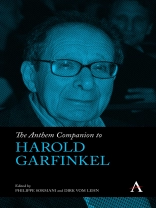By the late 1960s, Harold Garfinkel had coined the term “ethnomethodology” as a neologism for the field of study, the study of “people’s methods, ” that his seminal collection of pioneering studies – Studies in Ethnomethodology (Garfinkel 1967) – was to make public. Up to the present day, the field has developed, both diversifying and deepening its research interests.
The Anthem Companion to Harold Garfinkel brings together leading scholars and upcoming researchers in contemporary ethnomethodology to bring out the experimental character of Garfinkel’s legacy in the social sciences and beyond. Therefore, the Companion takes its cue from Garfinkel’s noted “breaching experiments, ” enabling the reflexive investigation of “trust conditions” in situ, and asks how this research interest has been productively pursued and distinctively rearticulated, both within and beyond Garfinkel’s oeuvre. Whilst Garfinkel’s experimental legacy is often acknowledged, no systematic introduction to its distinctive outlook, tension-riddled diversification, and heuristic interest(s) is available to date. The Anthem Companion to Harold Garfinkel both fills and reflects upon that “gap in the literature, ” thereby articulating ethnomethodology’s experimental outlook, if not recasting its current research directions. The Editors’ Introduction charts the experimental outlook of ethnomethodology, spanning Garfinkel’s early experiments with “trust” and his later experimental interventions (e.g., via “tutorial problems”). The Companion’s Contributions range from exegetical to experimental studies and spell out Garfinkel’s experimental legacy in depth and detail, whilst showcasing its multifaceted development in and beyond ethnomethodology.
Inhoudsopgave
List of Illustrations; Introduction: Rediscovering Garfinkel’s “Experiments, ” Renewing Ethnomethodological Inquiry Philippe Sormani and Dirk vom Lehn; PART I EXEGESIS, 1.Garfinkel’s Praxeological “Experiments” Michael Lynch; 2.The Continuity of Garfinkel’s Approach: Seeking Ways of “Making the Phenomenon Available Again” Through the Experience and Usefulness of “Trouble” Clemens Eisenmann and Anne Warfield Rawls; PART II ‘EXPERIMENTS’, 3.Lay and Professional Competencies: Linking Garfinkel’s Tutorial Exercises to a Study of Legal Work Stacy Lee Burns; 4.Bargaining on Street-Markets as “Experiment in Miniature” Dirk vom Lehn; 5.Notes on Galileo’s Pendulum Dušan I. Bjelić; 6.Disruptures of Normal Appearances in Public Space: The Covid-19 Pandemic as a Natural Breaching Situation Lorenza Mondada and Hanna Svensson; 7.Gender as a Scientific Experiment: Toward a Queer Ethnomethodology Luca Greco; 8.Breaching and Robot Experiments: Continuing Harold Garfinkel’s Spirit of Experimentation Keiichi Yamazaki and Yusuke Arano; 9.Dealing with Daemons: Trust in Autonomous Systems Jonas Ivarsson; PART III IMPLICATIONS, 10.Experimenting with the Archive? Performing Purdue in Paris, an Instructive Reprise Yaël Kreplak and Philippe Sormani; 11.Rereading Galileo’s Inclined Plane Demonstration Kenneth Liberman, in conversation with Harold Garfinkel; Postface: “Experiments”—What Are We Talking About? A Plea For Conceptual Investigations Wes Sharrock; Notes on Contributors; Index of Names; Index of Subjects
Over de auteur
Philippe Sormani is Senior Researcher at the Institute of Social Sciences at the University of Lausanne, Switzerland. He is the author of Respecifying Lab Ethnography: An Ethnomethodological Study of Experimental Physics.
Dirk vom Lehn is Professor of Organisation and Practice at King’s Business School, King’s College London, UK. He is the author of Harold Garfinkel: The Creation and Development of Ethnomethodology.












